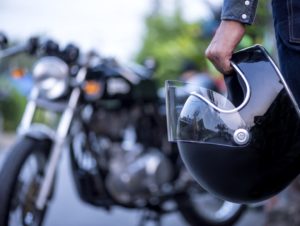When You Share in the Blame for Your Motorcycle Accident
Posted June 10th, 2019 by Anthony Carbone, PC.
Categories: Personal Injury.
The great Evil Knievel said it well. “Riding a motorcycle on today’s highways, you have to ride in a very defensive manner.” That said, you could contribute to the circumstances that cause you to crash. So, what happens when you share in the blame for your motorcycle accident? 
While a great many motorcycles accidents happen in springtime, the risk increases once summer begins. Riders don’t only need to be defensive on highways. In congested areas like Jersey City and Newark, bikers face different types of challenges. Among them, are visibility and positioning issues, especially at intersections. You may already know it. You’re most likely to crash on a street controlled by a traffic signal or sign than anywhere else. In fact, a great many motorcycle accidents happen when the driver of a car or SUV attempts to make a left turn.
- Meanwhile, there’s a chance you contributed to the accident that caused your injuries. Let’s say you had the stop sign, and the other driver claims you barely stopped for it.
- First, as a biker, you’re likely more cautious than most. After all, you know you’re vulnerable to harm. However, you might not totally understand the law regarding stop signs in New Jersey.
A quick review of NJSA 39:4-144 provides some interesting insight as far as stopping or yielding the right of way before entering a stop or yield intersection. What if you face allegations that you coasted through the stop sign? Or, accuses you of a “rolling stop.” No doubt an experienced personal injury attorney investigating your claim will attempt to disprove the other party’s contentions. In the meantime, you could still recover money. And, yes, even if you share in the blame for the circumstances leading to your crash.
Comparative Negligence and Your Motorcycle Accident
 New Jersey laws consider the fault of all parties when it comes to all types of personal injury claims. Your ability to collect money damages for your injuries relies on a legal concept known as comparative negligence. What does this mean exactly? To understand comparative negligence, you need some information about contributory negligence. As you put the two words together, you can most likely figure out the definition. Did your actions or inaction contribute to your motorcycle accident?
New Jersey laws consider the fault of all parties when it comes to all types of personal injury claims. Your ability to collect money damages for your injuries relies on a legal concept known as comparative negligence. What does this mean exactly? To understand comparative negligence, you need some information about contributory negligence. As you put the two words together, you can most likely figure out the definition. Did your actions or inaction contribute to your motorcycle accident?
- In some states, a finding of contributory negligence negates the claim. The injury victim receives no money.
However, New Jersey is different. According to NJSA 2A:15-5.1, contributory negligence does not bar recovery. Even if you were partially to blame for your accident, you might still be able to collect damages. Here’s where comparative negligence matters when it comes to your accident claim. The first part involves allocating a percentage of fault to each party. Provided you were less than 50% liable, you are entitled to damages.
Since most cases are settled outside of court, consider what happens next. Your attorney negotiates a settlement amount with the insurance company. This first means determining the total value of your case based on the extent of your injuries and related losses. Bikers often suffer severe damages as a result of motorcycle collisions. Your injuries might warrant a settlement offer of $100K or more. Meanwhile, your attorney and the insurance adjuster decide that your actions made you 20% at fault for the accident. Under the laws of comparative negligence, you would still recover money damages. However, you would be only entitled to $80K. Comparative negligence laws help plaintiffs even when they assume some blame for accidents.
- If your case requires a trial, the jury decides your portion of contributory negligence. Once again, that percentage determines how you are paid when the final numbers come back.
Contact Us
 With over 30 years representing injury victims, the Law Offices of Anthony Carbone recognizes the severity of motorcycle accident claims. We are not paid unless we recover money for you. Contact our office to learn how we can help you. CALL NOW 201-829-3805
With over 30 years representing injury victims, the Law Offices of Anthony Carbone recognizes the severity of motorcycle accident claims. We are not paid unless we recover money for you. Contact our office to learn how we can help you. CALL NOW 201-829-3805


